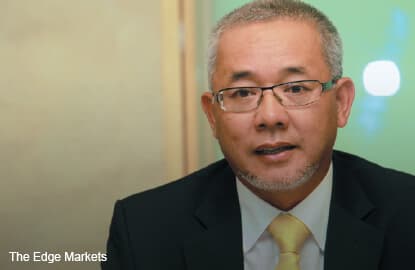
DAGANG NeXchange Bhd (DNeX) recently won a RM104.3 million contract to operate and manage the vehicle entry permit (VEP) and road charge (RC) system for foreign-registered vehicles entering Malaysia through Johor.
The contract, awarded to DNeX’s 51%-owned subsidiary, DNeX RFID Sdn Bhd, is for five years and will help the company diversify from the national single window contract secured by its information technology division.
DNeX RFID had earlier bagged a RM45 million contract to construct the IT infrastructure for the VEP and RC system.
Analysts opine that this is a good business for DNeX and would be a “relatively easy” job for the company, given that it is also involved in setting up the infrastructure.
“All they need to do is to set up the system and maintain it. They would only need to incur software cost for it. It’s a high margin job,” says an analyst with a local research house.
Analysts estimate the net margin from the job to be at least 20%. Based on a back-of-the-envelope calculation, this would translate into RM20.86 million over five years.
DNeX executive deputy chairman Datuk Samsul Husin says the company is also looking for opportunities in other land border crossings, like the Thailand-Malaysia border, which, however, sees a smaller number of vehicles passing through compared with the Singapore-Johor border.
Analysts though believe the implementation of the VEP and RC system at the Thailand-Malaysia border will take some time to materialise.
“I believe that the government may need to sort out the Singapore-Malaysia VEP and RC system first before implementing it at the Thailand-Malaysia border. Plus, there are many ways to enter Malaysia from Thailand. It is not as straightforward as the Johor border,” comments an analyst.
Currently, the Road Transport Department charges foreign vehicles coming into Malaysia through Johor RM20 per entry. But the VEP registration is still pending implementation.
According to Samsul, DNeX’s system for VEP registration is ready and the company is awaiting further instruction and final review from the main contractor, TCSens Sdn Bhd.
The diversification is happening at the right time as the company’s bread-and-butter business — the national single window for trade facilitation — may come under pressure when the Malaysian Royal Customs Department switches to a new framework called uCustoms.
DNeX’s national single window contract with Customs was recently extended to September 2018.
The national single window is a trade facilitation system that allows exporters and importers to conduct all necessary Customs clearance processes through an online portal. DNeX, which developed the system some years ago, is the only company in the country that provides it. But under uCustoms, it will be one of two service providers involved in the trade facilitation process.
DNeX’s revenue from trade facilitation depends on the number of transactions. A service charge of 75 sen per kilobyte is imposed on government agencies, namely the Royal Malaysian Customs Department, while for the private sector, it is 80 sen per kilobyte. There is also a service charge of RM5 for each approved permit and certificate of origin application.
Competition may be looming on the horizon but Samsul remains unperturbed. He believes the company’s knowledge, expertise and operational know-how in the provision of e-commerce services for trade facilitation over the last 25 years have positioned it well to capture the market.
Its exclusivity in trade facilitation is intact but the company is not resting on its laurels. “We are looking to expand in e-services for trade facilitation. We are also looking to expand our reach among the private ports in Malaysia,” remarks Samsul.
While the IT side of its business, like the national single window and the VEP and RC system, provides DNeX with stable recurring income, analysts highlight that growth for DNeX will come from its oil and gas segment, which it diversified into in 2013.
“They are a new player on the oil and gas scene. However, this is a difficult period for oil and gas companies; it’s not as easy to make profits anymore. A lot depends on how the operations are executed,” says the analyst with the local research house.
DNeX has a 30% stake in Ping Petroleum Ltd, an upstream company that focuses on shallow water offshore production. Ping has a 50% share in the Anasuria cluster in the UK’s Central North Sea, which is a boon for DNeX.
DNeX also wholly owns OGPC Group, a provider of equipment and services to the oil and gas, petrochemicals and power and general industries.
It is worth noting that DNeX’s oil and gas division was awarded an umbrella contract in April last year for the provision of directional drilling services to Petronas Carigali Sdn Bhd.
In an interview with The Edge Financial Daily, DNeX group managing director Zainal Abidin Jalil said the company is positioning itself to capture a number of jobs under the umbrella contract this year.
For the cumulative nine months ended Sept 30, 2016, DNeX’s net profit ballooned to RM101.22 million or 10.44 sen per share, which is more than eight times the net profit recorded a year earlier — RM11.75 million or 0.96 sen per share. Revenue expanded to RM111.15 million from RM67.64 million previously.
DNeX attributed the higher earnings to partial revenue recognition from the VEP and RC contract, post-acquisition revenue of OGPC Group and growth in the group’s trade facilitation business. It said the sharp increase in its net profit was due to a contribution from its 30% associate Ping Petroleum and the post-acquisition results of OGPC Group.
Over the last year, DNeX’s share price has gained 37.8% and it closed at 28 sen last Thursday.
Save by subscribing to us for your print and/or digital copy.
P/S: The Edge is also available on Apple's AppStore and Androids' Google Play.